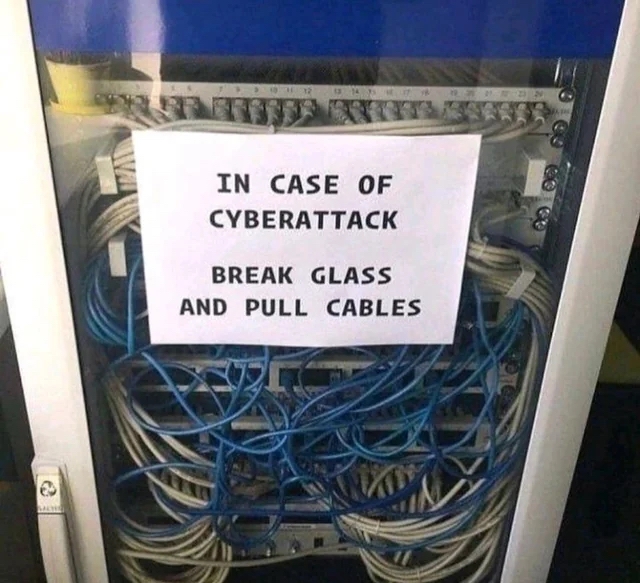this post was submitted on 08 Oct 2023
805 points (98.7% liked)
Programmer Humor
32850 readers
95 users here now
Post funny things about programming here! (Or just rant about your favourite programming language.)
Rules:
- Posts must be relevant to programming, programmers, or computer science.
- No NSFW content.
- Jokes must be in good taste. No hate speech, bigotry, etc.
founded 5 years ago
MODERATORS
you are viewing a single comment's thread
view the rest of the comments
view the rest of the comments

Great idea, and realize likely a joke, but wouldn’t you just need to pull the one or two that connect out to the internet?
There could, in theory, be a malicious machine on the internal network that was previously infected, which is now acting as command and control. So if you didn't know which one it was...
Turn of the power, no need to rip anything
Use a bomb. No need to take out the lights.
Nuke it from orbit. It's the only way to be sure.
It's better to throw it away into a black hole.
That's generally a good idea, however, there can be reasons not to do it.
The device could be infected in a way that it won't turn on again.
You might have an isolated management network that allows you to monitor the device and traffic (naturally ripping all cables also disconnects the management network).
And whatnot. But generally I agree.
You two are overlooking the most important thing. It might be fun to crazily rip out the cables then make a junior guy go trace and repatch it all. The opportunity to legitimately do that doesn't come along often.
Where's your sense of drama???
Given that fucking rats nest of cables, even if you needed to only pull one: good luck finding it in a hurry and good luck pulling only that one.
It is either the white one or the blue one so the odds are 50/50, right? /s
Well the white ones look like they were somewhat cable managed.
God have pity on that mortal souls of its a blue one.
Depends. If you're at home with a single endpoint, maybe.
But in cases like the image there's a lot of internal traffic and you'd want to stop the malware spreading internally. There might not even be internet connection at all.
Most serious infections are able to work within isolated internal network. You can stop data breaches by cutting external traffic but if you have ransomware you might want to cut internal connections too.
You might be able to stop the ransomware from triggering on some devices. That of course depends on the type of ransomware and whether it's triggered based on time, external command or something else.
Who cares if it's ransomware, just restore your backups
I think that's rather odd comment. Naturally nobody wants ransomware. And there are good reasons.
Backups may exist, but do they work properly? Or are the backups encrypted too?
How old are the backups? They might be less than a day old. But less than a day might still mean a lot of extra work and financial loss.
There might be a lot of work restoring the backups. You might have a lot of different systems.
In one of the largest ransomware cases in history, Maersk worked for months to get systems back up and running and data up to date. The insurance payout for it was 1,4 billions. Which is at least indicative of the cost.
And Maersk had recent and working backups.
Don't tell me you'd try to continue using the compromised systems if you somehow aborted the drive encryption process
Likely not, but definitely depends on the situation.
And how do you know the backup is not compromised?
I think it's not as clear cut. It's always a risk assessment and depends on context.
I have to say that I'm not a security expert, just an amateur with conceptual understanding of the topic and some opinions.
Wait, we were taking backups?